-
EXECUTIVE SUMMARY
-
Market Overview
-
Key Findings
-
Market Segmentation
-
Competitive Landscape
-
Challenges and Opportunities
-
Future Outlook
-
MARKET INTRODUCTION
-
Definition
-
Scope of the study
- Research Objective
- Assumption
- Limitations
-
RESEARCH METHODOLOGY
-
Overview
-
Data Mining
-
Secondary Research
-
Primary Research
- Primary Interviews and Information Gathering Process
- Breakdown of Primary Respondents
-
Forecasting Model
-
Market Size Estimation
- Bottom-Up Approach
- Top-Down Approach
-
Data Triangulation
-
Validation
-
MARKET DYNAMICS
-
Overview
-
Drivers
-
Restraints
-
Opportunities
-
MARKET FACTOR ANALYSIS
-
Value chain Analysis
-
Porter's Five Forces Analysis
- Bargaining Power of Suppliers
- Bargaining Power of Buyers
- Threat of New Entrants
- Threat of Substitutes
- Intensity of Rivalry
-
COVID-19 Impact Analysis
- Market Impact Analysis
- Regional Impact
- Opportunity and Threat Analysis
-
ORGANIC BABY BATHING PRODUCTS MARKET, BY PRODUCT TYPE (USD BILLION)
-
Organic Baby Shampoo
-
Organic Baby Body Wash
-
Organic Baby Bubble Bath
-
Organic Baby Bath Oil
-
ORGANIC BABY BATHING PRODUCTS MARKET, BY DISTRIBUTION CHANNEL (USD BILLION)
-
Online Retail
-
Supermarkets
-
Pharmacies
-
Specialty Baby Stores
-
ORGANIC BABY BATHING PRODUCTS MARKET, BY FORMULATION (USD BILLION)
-
Liquid
-
Cream
-
Gel
-
ORGANIC BABY BATHING PRODUCTS MARKET, BY END USER (USD BILLION)
-
Infants
-
Toddlers
-
ORGANIC BABY BATHING PRODUCTS MARKET, BY REGIONAL (USD BILLION)
-
North America
- US
- Canada
-
Europe
- Germany
- UK
- France
- Russia
- Italy
- Spain
- Rest of Europe
-
APAC
- China
- India
- Japan
- South Korea
- Malaysia
- Thailand
- Indonesia
- Rest of APAC
-
South America
- Brazil
- Mexico
- Argentina
- Rest of South America
-
MEA
- GCC Countries
- South Africa
- Rest of MEA
-
COMPETITIVE LANDSCAPE
-
Overview
-
Competitive Analysis
-
Market share Analysis
-
Major Growth Strategy in the Organic Baby Bathing Products Market
-
Competitive Benchmarking
-
Leading Players in Terms of Number of Developments in the Organic Baby Bathing Products Market
-
Key developments and growth strategies
- New Product Launch/Service Deployment
- Merger & Acquisitions
- Joint Ventures
-
Major Players Financial Matrix
- Sales and Operating Income
- Major Players R&D Expenditure. 2023
-
COMPANY PROFILES
-
Seventh Generation
- Financial Overview
- Products Offered
- Key Developments
- SWOT Analysis
- Key Strategies
-
Earth Mama
- Financial Overview
- Products Offered
- Key Developments
- SWOT Analysis
- Key Strategies
-
California Baby
- Financial Overview
- Products Offered
- Key Developments
- SWOT Analysis
- Key Strategies
-
Burt's Bees
- Financial Overview
- Products Offered
- Key Developments
- SWOT Analysis
- Key Strategies
-
Alba Botanica
- Financial Overview
- Products Offered
- Key Developments
- SWOT Analysis
- Key Strategies
-
P and G
- Financial Overview
- Products Offered
- Key Developments
- SWOT Analysis
- Key Strategies
-
The Honest Company
- Financial Overview
- Products Offered
- Key Developments
- SWOT Analysis
- Key Strategies
-
Weleda
- Financial Overview
- Products Offered
- Key Developments
- SWOT Analysis
- Key Strategies
-
Aveeno
- Financial Overview
- Products Offered
- Key Developments
- SWOT Analysis
- Key Strategies
-
Babyganics
- Financial Overview
- Products Offered
- Key Developments
- SWOT Analysis
- Key Strategies
-
Cotton Babies
- Financial Overview
- Products Offered
- Key Developments
- SWOT Analysis
- Key Strategies
-
Johnson's
- Financial Overview
- Products Offered
- Key Developments
- SWOT Analysis
- Key Strategies
-
CeraVe
- Financial Overview
- Products Offered
- Key Developments
- SWOT Analysis
- Key Strategies
-
Coconut Hedgehog
- Financial Overview
- Products Offered
- Key Developments
- SWOT Analysis
- Key Strategies
-
Mustela
- Financial Overview
- Products Offered
- Key Developments
- SWOT Analysis
- Key Strategies
-
APPENDIX
-
References
-
Related Reports
-
LIST OF TABLES
-
LIST OF ASSUMPTIONS
-
NORTH AMERICA ORGANIC BABY BATHING PRODUCTS MARKET SIZE ESTIMATES & FORECAST, BY PRODUCT TYPE, 2019-2032 (USD BILLIONS)
-
NORTH AMERICA ORGANIC BABY BATHING PRODUCTS MARKET SIZE ESTIMATES & FORECAST, BY DISTRIBUTION CHANNEL, 2019-2032 (USD BILLIONS)
-
NORTH AMERICA ORGANIC BABY BATHING PRODUCTS MARKET SIZE ESTIMATES & FORECAST, BY FORMULATION, 2019-2032 (USD BILLIONS)
-
NORTH AMERICA ORGANIC BABY BATHING PRODUCTS MARKET SIZE ESTIMATES & FORECAST, BY END USER, 2019-2032 (USD BILLIONS)
-
NORTH AMERICA ORGANIC BABY BATHING PRODUCTS MARKET SIZE ESTIMATES & FORECAST, BY REGIONAL, 2019-2032 (USD BILLIONS)
-
US ORGANIC BABY BATHING PRODUCTS MARKET SIZE ESTIMATES & FORECAST, BY PRODUCT TYPE, 2019-2032 (USD BILLIONS)
-
US ORGANIC BABY BATHING PRODUCTS MARKET SIZE ESTIMATES & FORECAST, BY DISTRIBUTION CHANNEL, 2019-2032 (USD BILLIONS)
-
US ORGANIC BABY BATHING PRODUCTS MARKET SIZE ESTIMATES & FORECAST, BY FORMULATION, 2019-2032 (USD BILLIONS)
-
US ORGANIC BABY BATHING PRODUCTS MARKET SIZE ESTIMATES & FORECAST, BY END USER, 2019-2032 (USD BILLIONS)
-
US ORGANIC BABY BATHING PRODUCTS MARKET SIZE ESTIMATES & FORECAST, BY REGIONAL, 2019-2032 (USD BILLIONS)
-
CANADA ORGANIC BABY BATHING PRODUCTS MARKET SIZE ESTIMATES & FORECAST, BY PRODUCT TYPE, 2019-2032 (USD BILLIONS)
-
CANADA ORGANIC BABY BATHING PRODUCTS MARKET SIZE ESTIMATES & FORECAST, BY DISTRIBUTION CHANNEL, 2019-2032 (USD BILLIONS)
-
CANADA ORGANIC BABY BATHING PRODUCTS MARKET SIZE ESTIMATES & FORECAST, BY FORMULATION, 2019-2032 (USD BILLIONS)
-
CANADA ORGANIC BABY BATHING PRODUCTS MARKET SIZE ESTIMATES & FORECAST, BY END USER, 2019-2032 (USD BILLIONS)
-
CANADA ORGANIC BABY BATHING PRODUCTS MARKET SIZE ESTIMATES & FORECAST, BY REGIONAL, 2019-2032 (USD BILLIONS)
-
EUROPE ORGANIC BABY BATHING PRODUCTS MARKET SIZE ESTIMATES & FORECAST, BY PRODUCT TYPE, 2019-2032 (USD BILLIONS)
-
EUROPE ORGANIC BABY BATHING PRODUCTS MARKET SIZE ESTIMATES & FORECAST, BY DISTRIBUTION CHANNEL, 2019-2032 (USD BILLIONS)
-
EUROPE ORGANIC BABY BATHING PRODUCTS MARKET SIZE ESTIMATES & FORECAST, BY FORMULATION, 2019-2032 (USD BILLIONS)
-
EUROPE ORGANIC BABY BATHING PRODUCTS MARKET SIZE ESTIMATES & FORECAST, BY END USER, 2019-2032 (USD BILLIONS)
-
EUROPE ORGANIC BABY BATHING PRODUCTS MARKET SIZE ESTIMATES & FORECAST, BY REGIONAL, 2019-2032 (USD BILLIONS)
-
GERMANY ORGANIC BABY BATHING PRODUCTS MARKET SIZE ESTIMATES & FORECAST, BY PRODUCT TYPE, 2019-2032 (USD BILLIONS)
-
GERMANY ORGANIC BABY BATHING PRODUCTS MARKET SIZE ESTIMATES & FORECAST, BY DISTRIBUTION CHANNEL, 2019-2032 (USD BILLIONS)
-
GERMANY ORGANIC BABY BATHING PRODUCTS MARKET SIZE ESTIMATES & FORECAST, BY FORMULATION, 2019-2032 (USD BILLIONS)
-
GERMANY ORGANIC BABY BATHING PRODUCTS MARKET SIZE ESTIMATES & FORECAST, BY END USER, 2019-2032 (USD BILLIONS)
-
GERMANY ORGANIC BABY BATHING PRODUCTS MARKET SIZE ESTIMATES & FORECAST, BY REGIONAL, 2019-2032 (USD BILLIONS)
-
UK ORGANIC BABY BATHING PRODUCTS MARKET SIZE ESTIMATES & FORECAST, BY PRODUCT TYPE, 2019-2032 (USD BILLIONS)
-
UK ORGANIC BABY BATHING PRODUCTS MARKET SIZE ESTIMATES & FORECAST, BY DISTRIBUTION CHANNEL, 2019-2032 (USD BILLIONS)
-
UK ORGANIC BABY BATHING PRODUCTS MARKET SIZE ESTIMATES & FORECAST, BY FORMULATION, 2019-2032 (USD BILLIONS)
-
UK ORGANIC BABY BATHING PRODUCTS MARKET SIZE ESTIMATES & FORECAST, BY END USER, 2019-2032 (USD BILLIONS)
-
UK ORGANIC BABY BATHING PRODUCTS MARKET SIZE ESTIMATES & FORECAST, BY REGIONAL, 2019-2032 (USD BILLIONS)
-
FRANCE ORGANIC BABY BATHING PRODUCTS MARKET SIZE ESTIMATES & FORECAST, BY PRODUCT TYPE, 2019-2032 (USD BILLIONS)
-
FRANCE ORGANIC BABY BATHING PRODUCTS MARKET SIZE ESTIMATES & FORECAST, BY DISTRIBUTION CHANNEL, 2019-2032 (USD BILLIONS)
-
FRANCE ORGANIC BABY BATHING PRODUCTS MARKET SIZE ESTIMATES & FORECAST, BY FORMULATION, 2019-2032 (USD BILLIONS)
-
FRANCE ORGANIC BABY BATHING PRODUCTS MARKET SIZE ESTIMATES & FORECAST, BY END USER, 2019-2032 (USD BILLIONS)
-
FRANCE ORGANIC BABY BATHING PRODUCTS MARKET SIZE ESTIMATES & FORECAST, BY REGIONAL, 2019-2032 (USD BILLIONS)
-
RUSSIA ORGANIC BABY BATHING PRODUCTS MARKET SIZE ESTIMATES & FORECAST, BY PRODUCT TYPE, 2019-2032 (USD BILLIONS)
-
RUSSIA ORGANIC BABY BATHING PRODUCTS MARKET SIZE ESTIMATES & FORECAST, BY DISTRIBUTION CHANNEL, 2019-2032 (USD BILLIONS)
-
RUSSIA ORGANIC BABY BATHING PRODUCTS MARKET SIZE ESTIMATES & FORECAST, BY FORMULATION, 2019-2032 (USD BILLIONS)
-
RUSSIA ORGANIC BABY BATHING PRODUCTS MARKET SIZE ESTIMATES & FORECAST, BY END USER, 2019-2032 (USD BILLIONS)
-
RUSSIA ORGANIC BABY BATHING PRODUCTS MARKET SIZE ESTIMATES & FORECAST, BY REGIONAL, 2019-2032 (USD BILLIONS)
-
ITALY ORGANIC BABY BATHING PRODUCTS MARKET SIZE ESTIMATES & FORECAST, BY PRODUCT TYPE, 2019-2032 (USD BILLIONS)
-
ITALY ORGANIC BABY BATHING PRODUCTS MARKET SIZE ESTIMATES & FORECAST, BY DISTRIBUTION CHANNEL, 2019-2032 (USD BILLIONS)
-
ITALY ORGANIC BABY BATHING PRODUCTS MARKET SIZE ESTIMATES & FORECAST, BY FORMULATION, 2019-2032 (USD BILLIONS)
-
ITALY ORGANIC BABY BATHING PRODUCTS MARKET SIZE ESTIMATES & FORECAST, BY END USER, 2019-2032 (USD BILLIONS)
-
ITALY ORGANIC BABY BATHING PRODUCTS MARKET SIZE ESTIMATES & FORECAST, BY REGIONAL, 2019-2032 (USD BILLIONS)
-
SPAIN ORGANIC BABY BATHING PRODUCTS MARKET SIZE ESTIMATES & FORECAST, BY PRODUCT TYPE, 2019-2032 (USD BILLIONS)
-
SPAIN ORGANIC BABY BATHING PRODUCTS MARKET SIZE ESTIMATES & FORECAST, BY DISTRIBUTION CHANNEL, 2019-2032 (USD BILLIONS)
-
SPAIN ORGANIC BABY BATHING PRODUCTS MARKET SIZE ESTIMATES & FORECAST, BY FORMULATION, 2019-2032 (USD BILLIONS)
-
SPAIN ORGANIC BABY BATHING PRODUCTS MARKET SIZE ESTIMATES & FORECAST, BY END USER, 2019-2032 (USD BILLIONS)
-
SPAIN ORGANIC BABY BATHING PRODUCTS MARKET SIZE ESTIMATES & FORECAST, BY REGIONAL, 2019-2032 (USD BILLIONS)
-
REST OF EUROPE ORGANIC BABY BATHING PRODUCTS MARKET SIZE ESTIMATES & FORECAST, BY PRODUCT TYPE, 2019-2032 (USD BILLIONS)
-
REST OF EUROPE ORGANIC BABY BATHING PRODUCTS MARKET SIZE ESTIMATES & FORECAST, BY DISTRIBUTION CHANNEL, 2019-2032 (USD BILLIONS)
-
REST OF EUROPE ORGANIC BABY BATHING PRODUCTS MARKET SIZE ESTIMATES & FORECAST, BY FORMULATION, 2019-2032 (USD BILLIONS)
-
REST OF EUROPE ORGANIC BABY BATHING PRODUCTS MARKET SIZE ESTIMATES & FORECAST, BY END USER, 2019-2032 (USD BILLIONS)
-
REST OF EUROPE ORGANIC BABY BATHING PRODUCTS MARKET SIZE ESTIMATES & FORECAST, BY REGIONAL, 2019-2032 (USD BILLIONS)
-
APAC ORGANIC BABY BATHING PRODUCTS MARKET SIZE ESTIMATES & FORECAST, BY PRODUCT TYPE, 2019-2032 (USD BILLIONS)
-
APAC ORGANIC BABY BATHING PRODUCTS MARKET SIZE ESTIMATES & FORECAST, BY DISTRIBUTION CHANNEL, 2019-2032 (USD BILLIONS)
-
APAC ORGANIC BABY BATHING PRODUCTS MARKET SIZE ESTIMATES & FORECAST, BY FORMULATION, 2019-2032 (USD BILLIONS)
-
APAC ORGANIC BABY BATHING PRODUCTS MARKET SIZE ESTIMATES & FORECAST, BY END USER, 2019-2032 (USD BILLIONS)
-
APAC ORGANIC BABY BATHING PRODUCTS MARKET SIZE ESTIMATES & FORECAST, BY REGIONAL, 2019-2032 (USD BILLIONS)
-
CHINA ORGANIC BABY BATHING PRODUCTS MARKET SIZE ESTIMATES & FORECAST, BY PRODUCT TYPE, 2019-2032 (USD BILLIONS)
-
CHINA ORGANIC BABY BATHING PRODUCTS MARKET SIZE ESTIMATES & FORECAST, BY DISTRIBUTION CHANNEL, 2019-2032 (USD BILLIONS)
-
CHINA ORGANIC BABY BATHING PRODUCTS MARKET SIZE ESTIMATES & FORECAST, BY FORMULATION, 2019-2032 (USD BILLIONS)
-
CHINA ORGANIC BABY BATHING PRODUCTS MARKET SIZE ESTIMATES & FORECAST, BY END USER, 2019-2032 (USD BILLIONS)
-
CHINA ORGANIC BABY BATHING PRODUCTS MARKET SIZE ESTIMATES & FORECAST, BY REGIONAL, 2019-2032 (USD BILLIONS)
-
INDIA ORGANIC BABY BATHING PRODUCTS MARKET SIZE ESTIMATES & FORECAST, BY PRODUCT TYPE, 2019-2032 (USD BILLIONS)
-
INDIA ORGANIC BABY BATHING PRODUCTS MARKET SIZE ESTIMATES & FORECAST, BY DISTRIBUTION CHANNEL, 2019-2032 (USD BILLIONS)
-
INDIA ORGANIC BABY BATHING PRODUCTS MARKET SIZE ESTIMATES & FORECAST, BY FORMULATION, 2019-2032 (USD BILLIONS)
-
INDIA ORGANIC BABY BATHING PRODUCTS MARKET SIZE ESTIMATES & FORECAST, BY END USER, 2019-2032 (USD BILLIONS)
-
INDIA ORGANIC BABY BATHING PRODUCTS MARKET SIZE ESTIMATES & FORECAST, BY REGIONAL, 2019-2032 (USD BILLIONS)
-
JAPAN ORGANIC BABY BATHING PRODUCTS MARKET SIZE ESTIMATES & FORECAST, BY PRODUCT TYPE, 2019-2032 (USD BILLIONS)
-
JAPAN ORGANIC BABY BATHING PRODUCTS MARKET SIZE ESTIMATES & FORECAST, BY DISTRIBUTION CHANNEL, 2019-2032 (USD BILLIONS)
-
JAPAN ORGANIC BABY BATHING PRODUCTS MARKET SIZE ESTIMATES & FORECAST, BY FORMULATION, 2019-2032 (USD BILLIONS)
-
JAPAN ORGANIC BABY BATHING PRODUCTS MARKET SIZE ESTIMATES & FORECAST, BY END USER, 2019-2032 (USD BILLIONS)
-
JAPAN ORGANIC BABY BATHING PRODUCTS MARKET SIZE ESTIMATES & FORECAST, BY REGIONAL, 2019-2032 (USD BILLIONS)
-
SOUTH KOREA ORGANIC BABY BATHING PRODUCTS MARKET SIZE ESTIMATES & FORECAST, BY PRODUCT TYPE, 2019-2032 (USD BILLIONS)
-
SOUTH KOREA ORGANIC BABY BATHING PRODUCTS MARKET SIZE ESTIMATES & FORECAST, BY DISTRIBUTION CHANNEL, 2019-2032 (USD BILLIONS)
-
SOUTH KOREA ORGANIC BABY BATHING PRODUCTS MARKET SIZE ESTIMATES & FORECAST, BY FORMULATION, 2019-2032 (USD BILLIONS)
-
SOUTH KOREA ORGANIC BABY BATHING PRODUCTS MARKET SIZE ESTIMATES & FORECAST, BY END USER, 2019-2032 (USD BILLIONS)
-
SOUTH KOREA ORGANIC BABY BATHING PRODUCTS MARKET SIZE ESTIMATES & FORECAST, BY REGIONAL, 2019-2032 (USD BILLIONS)
-
MALAYSIA ORGANIC BABY BATHING PRODUCTS MARKET SIZE ESTIMATES & FORECAST, BY PRODUCT TYPE, 2019-2032 (USD BILLIONS)
-
MALAYSIA ORGANIC BABY BATHING PRODUCTS MARKET SIZE ESTIMATES & FORECAST, BY DISTRIBUTION CHANNEL, 2019-2032 (USD BILLIONS)
-
MALAYSIA ORGANIC BABY BATHING PRODUCTS MARKET SIZE ESTIMATES & FORECAST, BY FORMULATION, 2019-2032 (USD BILLIONS)
-
MALAYSIA ORGANIC BABY BATHING PRODUCTS MARKET SIZE ESTIMATES & FORECAST, BY END USER, 2019-2032 (USD BILLIONS)
-
MALAYSIA ORGANIC BABY BATHING PRODUCTS MARKET SIZE ESTIMATES & FORECAST, BY REGIONAL, 2019-2032 (USD BILLIONS)
-
THAILAND ORGANIC BABY BATHING PRODUCTS MARKET SIZE ESTIMATES & FORECAST, BY PRODUCT TYPE, 2019-2032 (USD BILLIONS)
-
THAILAND ORGANIC BABY BATHING PRODUCTS MARKET SIZE ESTIMATES & FORECAST, BY DISTRIBUTION CHANNEL, 2019-2032 (USD BILLIONS)
-
THAILAND ORGANIC BABY BATHING PRODUCTS MARKET SIZE ESTIMATES & FORECAST, BY FORMULATION, 2019-2032 (USD BILLIONS)
-
THAILAND ORGANIC BABY BATHING PRODUCTS MARKET SIZE ESTIMATES & FORECAST, BY END USER, 2019-2032 (USD BILLIONS)
-
THAILAND ORGANIC BABY BATHING PRODUCTS MARKET SIZE ESTIMATES & FORECAST, BY REGIONAL, 2019-2032 (USD BILLIONS)
-
INDONESIA ORGANIC BABY BATHING PRODUCTS MARKET SIZE ESTIMATES & FORECAST, BY PRODUCT TYPE, 2019-2032 (USD BILLIONS)
-
INDONESIA ORGANIC BABY BATHING PRODUCTS MARKET SIZE ESTIMATES & FORECAST, BY DISTRIBUTION CHANNEL, 2019-2032 (USD BILLIONS)
-
INDONESIA ORGANIC BABY BATHING PRODUCTS MARKET SIZE ESTIMATES & FORECAST, BY FORMULATION, 2019-2032 (USD BILLIONS)
-
INDONESIA ORGANIC BABY BATHING PRODUCTS MARKET SIZE ESTIMATES & FORECAST, BY END USER, 2019-2032 (USD BILLIONS)
-
INDONESIA ORGANIC BABY BATHING PRODUCTS MARKET SIZE ESTIMATES & FORECAST, BY REGIONAL, 2019-2032 (USD BILLIONS)
-
REST OF APAC ORGANIC BABY BATHING PRODUCTS MARKET SIZE ESTIMATES & FORECAST, BY PRODUCT TYPE, 2019-2032 (USD BILLIONS)
-
REST OF APAC ORGANIC BABY BATHING PRODUCTS MARKET SIZE ESTIMATES & FORECAST, BY DISTRIBUTION CHANNEL, 2019-2032 (USD BILLIONS)
-
REST OF APAC ORGANIC BABY BATHING PRODUCTS MARKET SIZE ESTIMATES & FORECAST, BY FORMULATION, 2019-2032 (USD BILLIONS)
-
REST OF APAC ORGANIC BABY BATHING PRODUCTS MARKET SIZE ESTIMATES & FORECAST, BY END USER, 2019-2032 (USD BILLIONS)
-
REST OF APAC ORGANIC BABY BATHING PRODUCTS MARKET SIZE ESTIMATES & FORECAST, BY REGIONAL, 2019-2032 (USD BILLIONS)
-
SOUTH AMERICA ORGANIC BABY BATHING PRODUCTS MARKET SIZE ESTIMATES & FORECAST, BY PRODUCT TYPE, 2019-2032 (USD BILLIONS)
-
SOUTH AMERICA ORGANIC BABY BATHING PRODUCTS MARKET SIZE ESTIMATES & FORECAST, BY DISTRIBUTION CHANNEL, 2019-2032 (USD BILLIONS)
-
SOUTH AMERICA ORGANIC BABY BATHING PRODUCTS MARKET SIZE ESTIMATES & FORECAST, BY FORMULATION, 2019-2032 (USD BILLIONS)
-
SOUTH AMERICA ORGANIC BABY BATHING PRODUCTS MARKET SIZE ESTIMATES & FORECAST, BY END USER, 2019-2032 (USD BILLIONS)
-
SOUTH AMERICA ORGANIC BABY BATHING PRODUCTS MARKET SIZE ESTIMATES & FORECAST, BY REGIONAL, 2019-2032 (USD BILLIONS)
-
BRAZIL ORGANIC BABY BATHING PRODUCTS MARKET SIZE ESTIMATES & FORECAST, BY PRODUCT TYPE, 2019-2032 (USD BILLIONS)
-
BRAZIL ORGANIC BABY BATHING PRODUCTS MARKET SIZE ESTIMATES & FORECAST, BY DISTRIBUTION CHANNEL, 2019-2032 (USD BILLIONS)
-
BRAZIL ORGANIC BABY BATHING PRODUCTS MARKET SIZE ESTIMATES & FORECAST, BY FORMULATION, 2019-2032 (USD BILLIONS)
-
BRAZIL ORGANIC BABY BATHING PRODUCTS MARKET SIZE ESTIMATES & FORECAST, BY END USER, 2019-2032 (USD BILLIONS)
-
BRAZIL ORGANIC BABY BATHING PRODUCTS MARKET SIZE ESTIMATES & FORECAST, BY REGIONAL, 2019-2032 (USD BILLIONS)
-
MEXICO ORGANIC BABY BATHING PRODUCTS MARKET SIZE ESTIMATES & FORECAST, BY PRODUCT TYPE, 2019-2032 (USD BILLIONS)
-
MEXICO ORGANIC BABY BATHING PRODUCTS MARKET SIZE ESTIMATES & FORECAST, BY DISTRIBUTION CHANNEL, 2019-2032 (USD BILLIONS)
-
MEXICO ORGANIC BABY BATHING PRODUCTS MARKET SIZE ESTIMATES & FORECAST, BY FORMULATION, 2019-2032 (USD BILLIONS)
-
MEXICO ORGANIC BABY BATHING PRODUCTS MARKET SIZE ESTIMATES & FORECAST, BY END USER, 2019-2032 (USD BILLIONS)
-
MEXICO ORGANIC BABY BATHING PRODUCTS MARKET SIZE ESTIMATES & FORECAST, BY REGIONAL, 2019-2032 (USD BILLIONS)
-
ARGENTINA ORGANIC BABY BATHING PRODUCTS MARKET SIZE ESTIMATES & FORECAST, BY PRODUCT TYPE, 2019-2032 (USD BILLIONS)
-
ARGENTINA ORGANIC BABY BATHING PRODUCTS MARKET SIZE ESTIMATES & FORECAST, BY DISTRIBUTION CHANNEL, 2019-2032 (USD BILLIONS)
-
ARGENTINA ORGANIC BABY BATHING PRODUCTS MARKET SIZE ESTIMATES & FORECAST, BY FORMULATION, 2019-2032 (USD BILLIONS)
-
ARGENTINA ORGANIC BABY BATHING PRODUCTS MARKET SIZE ESTIMATES & FORECAST, BY END USER, 2019-2032 (USD BILLIONS)
-
ARGENTINA ORGANIC BABY BATHING PRODUCTS MARKET SIZE ESTIMATES & FORECAST, BY REGIONAL, 2019-2032 (USD BILLIONS)
-
REST OF SOUTH AMERICA ORGANIC BABY BATHING PRODUCTS MARKET SIZE ESTIMATES & FORECAST, BY PRODUCT TYPE, 2019-2032 (USD BILLIONS)
-
REST OF SOUTH AMERICA ORGANIC BABY BATHING PRODUCTS MARKET SIZE ESTIMATES & FORECAST, BY DISTRIBUTION CHANNEL, 2019-2032 (USD BILLIONS)
-
REST OF SOUTH AMERICA ORGANIC BABY BATHING PRODUCTS MARKET SIZE ESTIMATES & FORECAST, BY FORMULATION, 2019-2032 (USD BILLIONS)
-
REST OF SOUTH AMERICA ORGANIC BABY BATHING PRODUCTS MARKET SIZE ESTIMATES & FORECAST, BY END USER, 2019-2032 (USD BILLIONS)
-
REST OF SOUTH AMERICA ORGANIC BABY BATHING PRODUCTS MARKET SIZE ESTIMATES & FORECAST, BY REGIONAL, 2019-2032 (USD BILLIONS)
-
MEA ORGANIC BABY BATHING PRODUCTS MARKET SIZE ESTIMATES & FORECAST, BY PRODUCT TYPE, 2019-2032 (USD BILLIONS)
-
MEA ORGANIC BABY BATHING PRODUCTS MARKET SIZE ESTIMATES & FORECAST, BY DISTRIBUTION CHANNEL, 2019-2032 (USD BILLIONS)
-
MEA ORGANIC BABY BATHING PRODUCTS MARKET SIZE ESTIMATES & FORECAST, BY FORMULATION, 2019-2032 (USD BILLIONS)
-
MEA ORGANIC BABY BATHING PRODUCTS MARKET SIZE ESTIMATES & FORECAST, BY END USER, 2019-2032 (USD BILLIONS)
-
MEA ORGANIC BABY BATHING PRODUCTS MARKET SIZE ESTIMATES & FORECAST, BY REGIONAL, 2019-2032 (USD BILLIONS)
-
GCC COUNTRIES ORGANIC BABY BATHING PRODUCTS MARKET SIZE ESTIMATES & FORECAST, BY PRODUCT TYPE, 2019-2032 (USD BILLIONS)
-
GCC COUNTRIES ORGANIC BABY BATHING PRODUCTS MARKET SIZE ESTIMATES & FORECAST, BY DISTRIBUTION CHANNEL, 2019-2032 (USD BILLIONS)
-
GCC COUNTRIES ORGANIC BABY BATHING PRODUCTS MARKET SIZE ESTIMATES & FORECAST, BY FORMULATION, 2019-2032 (USD BILLIONS)
-
GCC COUNTRIES ORGANIC BABY BATHING PRODUCTS MARKET SIZE ESTIMATES & FORECAST, BY END USER, 2019-2032 (USD BILLIONS)
-
GCC COUNTRIES ORGANIC BABY BATHING PRODUCTS MARKET SIZE ESTIMATES & FORECAST, BY REGIONAL, 2019-2032 (USD BILLIONS)
-
SOUTH AFRICA ORGANIC BABY BATHING PRODUCTS MARKET SIZE ESTIMATES & FORECAST, BY PRODUCT TYPE, 2019-2032 (USD BILLIONS)
-
SOUTH AFRICA ORGANIC BABY BATHING PRODUCTS MARKET SIZE ESTIMATES & FORECAST, BY DISTRIBUTION CHANNEL, 2019-2032 (USD BILLIONS)
-
SOUTH AFRICA ORGANIC BABY BATHING PRODUCTS MARKET SIZE ESTIMATES & FORECAST, BY FORMULATION, 2019-2032 (USD BILLIONS)
-
SOUTH AFRICA ORGANIC BABY BATHING PRODUCTS MARKET SIZE ESTIMATES & FORECAST, BY END USER, 2019-2032 (USD BILLIONS)
-
SOUTH AFRICA ORGANIC BABY BATHING PRODUCTS MARKET SIZE ESTIMATES & FORECAST, BY REGIONAL, 2019-2032 (USD BILLIONS)
-
REST OF MEA ORGANIC BABY BATHING PRODUCTS MARKET SIZE ESTIMATES & FORECAST, BY PRODUCT TYPE, 2019-2032 (USD BILLIONS)
-
REST OF MEA ORGANIC BABY BATHING PRODUCTS MARKET SIZE ESTIMATES & FORECAST, BY DISTRIBUTION CHANNEL, 2019-2032 (USD BILLIONS)
-
REST OF MEA ORGANIC BABY BATHING PRODUCTS MARKET SIZE ESTIMATES & FORECAST, BY FORMULATION, 2019-2032 (USD BILLIONS)
-
REST OF MEA ORGANIC BABY BATHING PRODUCTS MARKET SIZE ESTIMATES & FORECAST, BY END USER, 2019-2032 (USD BILLIONS)
-
REST OF MEA ORGANIC BABY BATHING PRODUCTS MARKET SIZE ESTIMATES & FORECAST, BY REGIONAL, 2019-2032 (USD BILLIONS)
-
PRODUCT LAUNCH/PRODUCT DEVELOPMENT/APPROVAL
-
ACQUISITION/PARTNERSHIP
-
LIST OF FIGURES
-
MARKET SYNOPSIS
-
NORTH AMERICA ORGANIC BABY BATHING PRODUCTS MARKET ANALYSIS
-
US ORGANIC BABY BATHING PRODUCTS MARKET ANALYSIS BY PRODUCT TYPE
-
US ORGANIC BABY BATHING PRODUCTS MARKET ANALYSIS BY DISTRIBUTION CHANNEL
-
US ORGANIC BABY BATHING PRODUCTS MARKET ANALYSIS BY FORMULATION
-
US ORGANIC BABY BATHING PRODUCTS MARKET ANALYSIS BY END USER
-
US ORGANIC BABY BATHING PRODUCTS MARKET ANALYSIS BY REGIONAL
-
CANADA ORGANIC BABY BATHING PRODUCTS MARKET ANALYSIS BY PRODUCT TYPE
-
CANADA ORGANIC BABY BATHING PRODUCTS MARKET ANALYSIS BY DISTRIBUTION CHANNEL
-
CANADA ORGANIC BABY BATHING PRODUCTS MARKET ANALYSIS BY FORMULATION
-
CANADA ORGANIC BABY BATHING PRODUCTS MARKET ANALYSIS BY END USER
-
CANADA ORGANIC BABY BATHING PRODUCTS MARKET ANALYSIS BY REGIONAL
-
EUROPE ORGANIC BABY BATHING PRODUCTS MARKET ANALYSIS
-
GERMANY ORGANIC BABY BATHING PRODUCTS MARKET ANALYSIS BY PRODUCT TYPE
-
GERMANY ORGANIC BABY BATHING PRODUCTS MARKET ANALYSIS BY DISTRIBUTION CHANNEL
-
GERMANY ORGANIC BABY BATHING PRODUCTS MARKET ANALYSIS BY FORMULATION
-
GERMANY ORGANIC BABY BATHING PRODUCTS MARKET ANALYSIS BY END USER
-
GERMANY ORGANIC BABY BATHING PRODUCTS MARKET ANALYSIS BY REGIONAL
-
UK ORGANIC BABY BATHING PRODUCTS MARKET ANALYSIS BY PRODUCT TYPE
-
UK ORGANIC BABY BATHING PRODUCTS MARKET ANALYSIS BY DISTRIBUTION CHANNEL
-
UK ORGANIC BABY BATHING PRODUCTS MARKET ANALYSIS BY FORMULATION
-
UK ORGANIC BABY BATHING PRODUCTS MARKET ANALYSIS BY END USER
-
UK ORGANIC BABY BATHING PRODUCTS MARKET ANALYSIS BY REGIONAL
-
FRANCE ORGANIC BABY BATHING PRODUCTS MARKET ANALYSIS BY PRODUCT TYPE
-
FRANCE ORGANIC BABY BATHING PRODUCTS MARKET ANALYSIS BY DISTRIBUTION CHANNEL
-
FRANCE ORGANIC BABY BATHING PRODUCTS MARKET ANALYSIS BY FORMULATION
-
FRANCE ORGANIC BABY BATHING PRODUCTS MARKET ANALYSIS BY END USER
-
FRANCE ORGANIC BABY BATHING PRODUCTS MARKET ANALYSIS BY REGIONAL
-
RUSSIA ORGANIC BABY BATHING PRODUCTS MARKET ANALYSIS BY PRODUCT TYPE
-
RUSSIA ORGANIC BABY BATHING PRODUCTS MARKET ANALYSIS BY DISTRIBUTION CHANNEL
-
RUSSIA ORGANIC BABY BATHING PRODUCTS MARKET ANALYSIS BY FORMULATION
-
RUSSIA ORGANIC BABY BATHING PRODUCTS MARKET ANALYSIS BY END USER
-
RUSSIA ORGANIC BABY BATHING PRODUCTS MARKET ANALYSIS BY REGIONAL
-
ITALY ORGANIC BABY BATHING PRODUCTS MARKET ANALYSIS BY PRODUCT TYPE
-
ITALY ORGANIC BABY BATHING PRODUCTS MARKET ANALYSIS BY DISTRIBUTION CHANNEL
-
ITALY ORGANIC BABY BATHING PRODUCTS MARKET ANALYSIS BY FORMULATION
-
ITALY ORGANIC BABY BATHING PRODUCTS MARKET ANALYSIS BY END USER
-
ITALY ORGANIC BABY BATHING PRODUCTS MARKET ANALYSIS BY REGIONAL
-
SPAIN ORGANIC BABY BATHING PRODUCTS MARKET ANALYSIS BY PRODUCT TYPE
-
SPAIN ORGANIC BABY BATHING PRODUCTS MARKET ANALYSIS BY DISTRIBUTION CHANNEL
-
SPAIN ORGANIC BABY BATHING PRODUCTS MARKET ANALYSIS BY FORMULATION
-
SPAIN ORGANIC BABY BATHING PRODUCTS MARKET ANALYSIS BY END USER
-
SPAIN ORGANIC BABY BATHING PRODUCTS MARKET ANALYSIS BY REGIONAL
-
REST OF EUROPE ORGANIC BABY BATHING PRODUCTS MARKET ANALYSIS BY PRODUCT TYPE
-
REST OF EUROPE ORGANIC BABY BATHING PRODUCTS MARKET ANALYSIS BY DISTRIBUTION CHANNEL
-
REST OF EUROPE ORGANIC BABY BATHING PRODUCTS MARKET ANALYSIS BY FORMULATION
-
REST OF EUROPE ORGANIC BABY BATHING PRODUCTS MARKET ANALYSIS BY END USER
-
REST OF EUROPE ORGANIC BABY BATHING PRODUCTS MARKET ANALYSIS BY REGIONAL
-
APAC ORGANIC BABY BATHING PRODUCTS MARKET ANALYSIS
-
CHINA ORGANIC BABY BATHING PRODUCTS MARKET ANALYSIS BY PRODUCT TYPE
-
CHINA ORGANIC BABY BATHING PRODUCTS MARKET ANALYSIS BY DISTRIBUTION CHANNEL
-
CHINA ORGANIC BABY BATHING PRODUCTS MARKET ANALYSIS BY FORMULATION
-
CHINA ORGANIC BABY BATHING PRODUCTS MARKET ANALYSIS BY END USER
-
CHINA ORGANIC BABY BATHING PRODUCTS MARKET ANALYSIS BY REGIONAL
-
INDIA ORGANIC BABY BATHING PRODUCTS MARKET ANALYSIS BY PRODUCT TYPE
-
INDIA ORGANIC BABY BATHING PRODUCTS MARKET ANALYSIS BY DISTRIBUTION CHANNEL
-
INDIA ORGANIC BABY BATHING PRODUCTS MARKET ANALYSIS BY FORMULATION
-
INDIA ORGANIC BABY BATHING PRODUCTS MARKET ANALYSIS BY END USER
-
INDIA ORGANIC BABY BATHING PRODUCTS MARKET ANALYSIS BY REGIONAL
-
JAPAN ORGANIC BABY BATHING PRODUCTS MARKET ANALYSIS BY PRODUCT TYPE
-
JAPAN ORGANIC BABY BATHING PRODUCTS MARKET ANALYSIS BY DISTRIBUTION CHANNEL
-
JAPAN ORGANIC BABY BATHING PRODUCTS MARKET ANALYSIS BY FORMULATION
-
JAPAN ORGANIC BABY BATHING PRODUCTS MARKET ANALYSIS BY END USER
-
JAPAN ORGANIC BABY BATHING PRODUCTS MARKET ANALYSIS BY REGIONAL
-
SOUTH KOREA ORGANIC BABY BATHING PRODUCTS MARKET ANALYSIS BY PRODUCT TYPE
-
SOUTH KOREA ORGANIC BABY BATHING PRODUCTS MARKET ANALYSIS BY DISTRIBUTION CHANNEL
-
SOUTH KOREA ORGANIC BABY BATHING PRODUCTS MARKET ANALYSIS BY FORMULATION
-
SOUTH KOREA ORGANIC BABY BATHING PRODUCTS MARKET ANALYSIS BY END USER
-
SOUTH KOREA ORGANIC BABY BATHING PRODUCTS MARKET ANALYSIS BY REGIONAL
-
MALAYSIA ORGANIC BABY BATHING PRODUCTS MARKET ANALYSIS BY PRODUCT TYPE
-
MALAYSIA ORGANIC BABY BATHING PRODUCTS MARKET ANALYSIS BY DISTRIBUTION CHANNEL
-
MALAYSIA ORGANIC BABY BATHING PRODUCTS MARKET ANALYSIS BY FORMULATION
-
MALAYSIA ORGANIC BABY BATHING PRODUCTS MARKET ANALYSIS BY END USER
-
MALAYSIA ORGANIC BABY BATHING PRODUCTS MARKET ANALYSIS BY REGIONAL
-
THAILAND ORGANIC BABY BATHING PRODUCTS MARKET ANALYSIS BY PRODUCT TYPE
-
THAILAND ORGANIC BABY BATHING PRODUCTS MARKET ANALYSIS BY DISTRIBUTION CHANNEL
-
THAILAND ORGANIC BABY BATHING PRODUCTS MARKET ANALYSIS BY FORMULATION
-
THAILAND ORGANIC BABY BATHING PRODUCTS MARKET ANALYSIS BY END USER
-
THAILAND ORGANIC BABY BATHING PRODUCTS MARKET ANALYSIS BY REGIONAL
-
INDONESIA ORGANIC BABY BATHING PRODUCTS MARKET ANALYSIS BY PRODUCT TYPE
-
INDONESIA ORGANIC BABY BATHING PRODUCTS MARKET ANALYSIS BY DISTRIBUTION CHANNEL
-
INDONESIA ORGANIC BABY BATHING PRODUCTS MARKET ANALYSIS BY FORMULATION
-
INDONESIA ORGANIC BABY BATHING PRODUCTS MARKET ANALYSIS BY END USER
-
INDONESIA ORGANIC BABY BATHING PRODUCTS MARKET ANALYSIS BY REGIONAL
-
REST OF APAC ORGANIC BABY BATHING PRODUCTS MARKET ANALYSIS BY PRODUCT TYPE
-
REST OF APAC ORGANIC BABY BATHING PRODUCTS MARKET ANALYSIS BY DISTRIBUTION CHANNEL
-
REST OF APAC ORGANIC BABY BATHING PRODUCTS MARKET ANALYSIS BY FORMULATION
-
REST OF APAC ORGANIC BABY BATHING PRODUCTS MARKET ANALYSIS BY END USER
-
REST OF APAC ORGANIC BABY BATHING PRODUCTS MARKET ANALYSIS BY REGIONAL
-
SOUTH AMERICA ORGANIC BABY BATHING PRODUCTS MARKET ANALYSIS
-
BRAZIL ORGANIC BABY BATHING PRODUCTS MARKET ANALYSIS BY PRODUCT TYPE
-
BRAZIL ORGANIC BABY BATHING PRODUCTS MARKET ANALYSIS BY DISTRIBUTION CHANNEL
-
BRAZIL ORGANIC BABY BATHING PRODUCTS MARKET ANALYSIS BY FORMULATION
-
BRAZIL ORGANIC BABY BATHING PRODUCTS MARKET ANALYSIS BY END USER
-
BRAZIL ORGANIC BABY BATHING PRODUCTS MARKET ANALYSIS BY REGIONAL
-
MEXICO ORGANIC BABY BATHING PRODUCTS MARKET ANALYSIS BY PRODUCT TYPE
-
MEXICO ORGANIC BABY BATHING PRODUCTS MARKET ANALYSIS BY DISTRIBUTION CHANNEL
-
MEXICO ORGANIC BABY BATHING PRODUCTS MARKET ANALYSIS BY FORMULATION
-
MEXICO ORGANIC BABY BATHING PRODUCTS MARKET ANALYSIS BY END USER
-
MEXICO ORGANIC BABY BATHING PRODUCTS MARKET ANALYSIS BY REGIONAL
-
ARGENTINA ORGANIC BABY BATHING PRODUCTS MARKET ANALYSIS BY PRODUCT TYPE
-
ARGENTINA ORGANIC BABY BATHING PRODUCTS MARKET ANALYSIS BY DISTRIBUTION CHANNEL
-
ARGENTINA ORGANIC BABY BATHING PRODUCTS MARKET ANALYSIS BY FORMULATION
-
ARGENTINA ORGANIC BABY BATHING PRODUCTS MARKET ANALYSIS BY END USER
-
ARGENTINA ORGANIC BABY BATHING PRODUCTS MARKET ANALYSIS BY REGIONAL
-
REST OF SOUTH AMERICA ORGANIC BABY BATHING PRODUCTS MARKET ANALYSIS BY PRODUCT TYPE
-
REST OF SOUTH AMERICA ORGANIC BABY BATHING PRODUCTS MARKET ANALYSIS BY DISTRIBUTION CHANNEL
-
REST OF SOUTH AMERICA ORGANIC BABY BATHING PRODUCTS MARKET ANALYSIS BY FORMULATION
-
REST OF SOUTH AMERICA ORGANIC BABY BATHING PRODUCTS MARKET ANALYSIS BY END USER
-
REST OF SOUTH AMERICA ORGANIC BABY BATHING PRODUCTS MARKET ANALYSIS BY REGIONAL
-
MEA ORGANIC BABY BATHING PRODUCTS MARKET ANALYSIS
-
GCC COUNTRIES ORGANIC BABY BATHING PRODUCTS MARKET ANALYSIS BY PRODUCT TYPE
-
GCC COUNTRIES ORGANIC BABY BATHING PRODUCTS MARKET ANALYSIS BY DISTRIBUTION CHANNEL
-
GCC COUNTRIES ORGANIC BABY BATHING PRODUCTS MARKET ANALYSIS BY FORMULATION
-
GCC COUNTRIES ORGANIC BABY BATHING PRODUCTS MARKET ANALYSIS BY END USER
-
GCC COUNTRIES ORGANIC BABY BATHING PRODUCTS MARKET ANALYSIS BY REGIONAL
-
SOUTH AFRICA ORGANIC BABY BATHING PRODUCTS MARKET ANALYSIS BY PRODUCT TYPE
-
SOUTH AFRICA ORGANIC BABY BATHING PRODUCTS MARKET ANALYSIS BY DISTRIBUTION CHANNEL
-
SOUTH AFRICA ORGANIC BABY BATHING PRODUCTS MARKET ANALYSIS BY FORMULATION
-
SOUTH AFRICA ORGANIC BABY BATHING PRODUCTS MARKET ANALYSIS BY END USER
-
SOUTH AFRICA ORGANIC BABY BATHING PRODUCTS MARKET ANALYSIS BY REGIONAL
-
REST OF MEA ORGANIC BABY BATHING PRODUCTS MARKET ANALYSIS BY PRODUCT TYPE
-
REST OF MEA ORGANIC BABY BATHING PRODUCTS MARKET ANALYSIS BY DISTRIBUTION CHANNEL
-
REST OF MEA ORGANIC BABY BATHING PRODUCTS MARKET ANALYSIS BY FORMULATION
-
REST OF MEA ORGANIC BABY BATHING PRODUCTS MARKET ANALYSIS BY END USER
-
REST OF MEA ORGANIC BABY BATHING PRODUCTS MARKET ANALYSIS BY REGIONAL
-
KEY BUYING CRITERIA OF ORGANIC BABY BATHING PRODUCTS MARKET
-
RESEARCH PROCESS OF MRFR
-
DRO ANALYSIS OF ORGANIC BABY BATHING PRODUCTS MARKET
-
DRIVERS IMPACT ANALYSIS: ORGANIC BABY BATHING PRODUCTS MARKET
-
RESTRAINTS IMPACT ANALYSIS: ORGANIC BABY BATHING PRODUCTS MARKET
-
SUPPLY / VALUE CHAIN: ORGANIC BABY BATHING PRODUCTS MARKET
-
ORGANIC BABY BATHING PRODUCTS MARKET, BY PRODUCT TYPE, 2024 (% SHARE)
-
ORGANIC BABY BATHING PRODUCTS MARKET, BY PRODUCT TYPE, 2019 TO 2032 (USD Billions)
-
ORGANIC BABY BATHING PRODUCTS MARKET, BY DISTRIBUTION CHANNEL, 2024 (% SHARE)
-
ORGANIC BABY BATHING PRODUCTS MARKET, BY DISTRIBUTION CHANNEL, 2019 TO 2032 (USD Billions)
-
ORGANIC BABY BATHING PRODUCTS MARKET, BY FORMULATION, 2024 (% SHARE)
-
ORGANIC BABY BATHING PRODUCTS MARKET, BY FORMULATION, 2019 TO 2032 (USD Billions)
-
ORGANIC BABY BATHING PRODUCTS MARKET, BY END USER, 2024 (% SHARE)
-
ORGANIC BABY BATHING PRODUCTS MARKET, BY END USER, 2019 TO 2032 (USD Billions)
-
ORGANIC BABY BATHING PRODUCTS MARKET, BY REGIONAL, 2024 (% SHARE)
-
ORGANIC BABY BATHING PRODUCTS MARKET, BY REGIONAL, 2019 TO 2032 (USD Billions)
-
BENCHMARKING OF MAJOR COMPETITORS


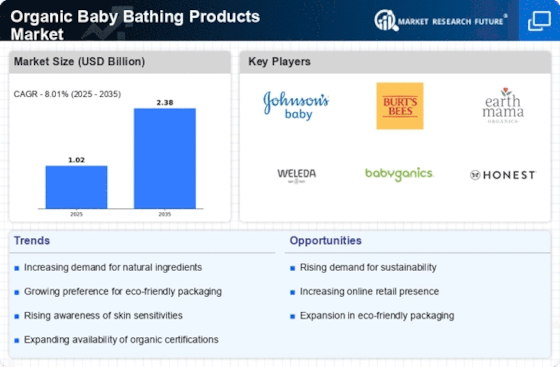
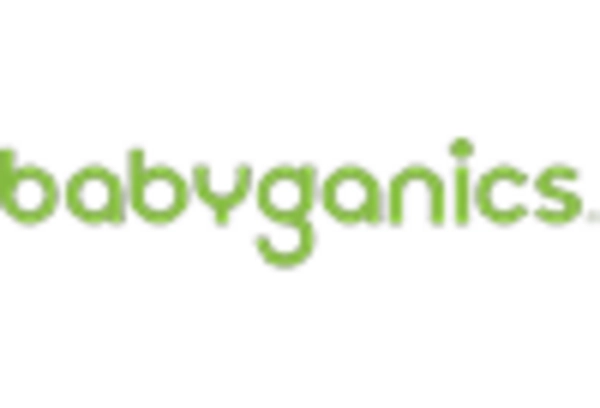
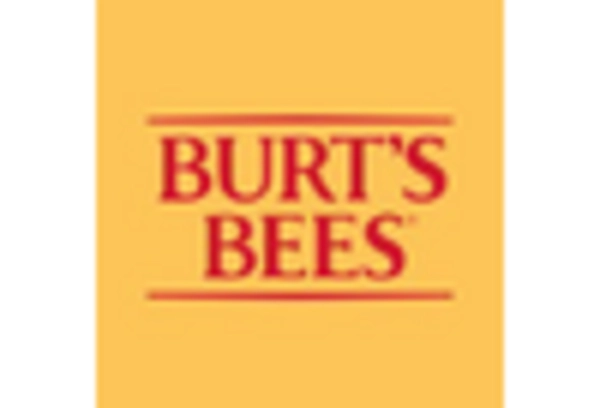
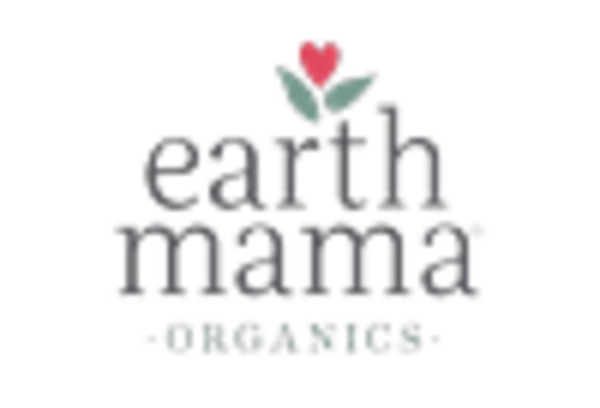
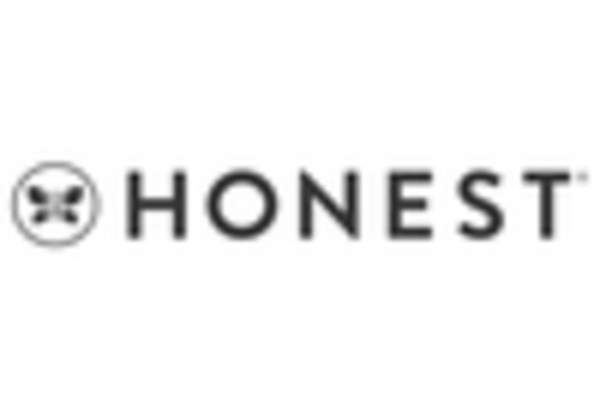
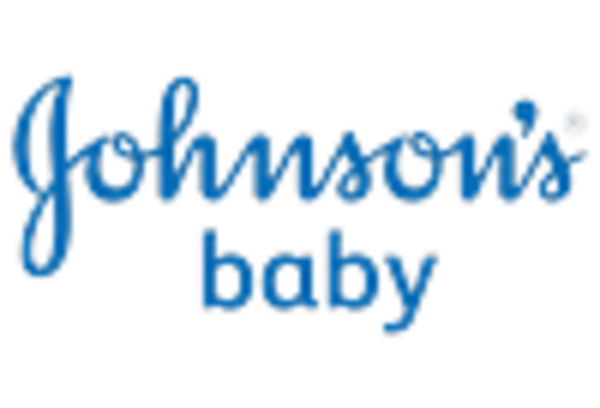
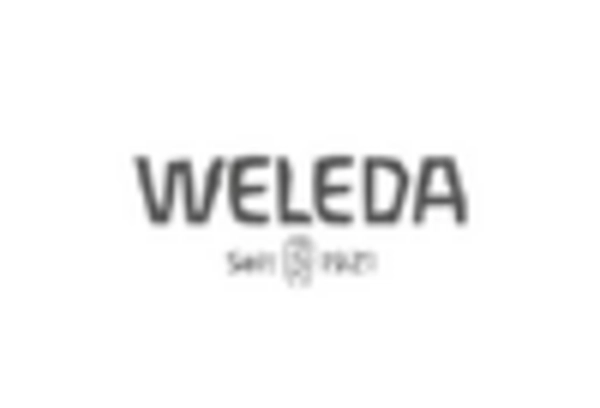









Leave a Comment